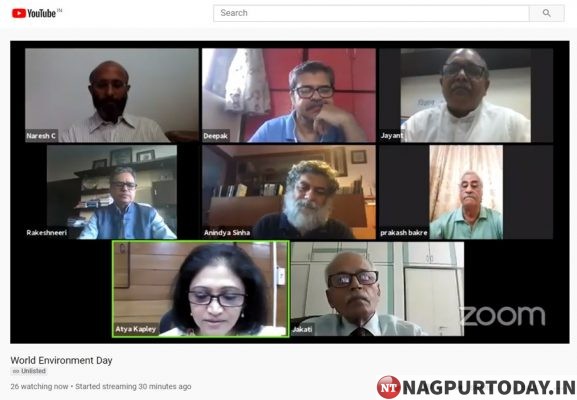Nagpur: CSIR-National Environmental Engineering Research Institute (CSIR-NEERI) and Vijnana Bharati (VIBHA) jointly organised various programmes to mark the World Environment Day on 5th June, 2020. The panel discussion on ‘Urban Biodiversity and Biodiversity Preservation for Integrating Society’ was organised on this occasion, in which Dr. Deepak Apte, Director, Bombay Natural History Society (BNHS); Prof. Anindya Sinha, National Institute of Advanced Studies (NIAS); Prof. P P Bakre, Former Professor, Rajasthan University; Shri Jayant Sahasrabuddhe, National Organising Secretary, Vijnana Bharati; and Dr. R D Jakati, IFS, Former Director, Indira Gandhi National Forest Academy took part as expert panellists.
While delivering the keynote address, Prof. Sinha highlighted the challenges to biodiversity conservation in north-eastern India. He informed that there are 36 global biodiversity hotspots across the world, out of which 4 are in India including the Indian Himalayan region, north-eastern India, Nicobar group of Islands and Western Ghats.
Expressing concern over the Eastern Himalayas, Prof. Sinha said that Arunachal Pradesh is one among the globally important eco-regions rich in flora and fauna. But due to human interference and climate change, the biodiversity in the Arunachal Pradesh is gradually diminishing, he added. Prof. Sinha mentioned that the state of biodiversity and its significance are comparatively poorly known to conservationists in north-eastern India due to low priority in research, inaccessibility, and remoteness.
However, one of his biological expeditions in this biodiversity hotspot resulted in the discovery of the Arunachal macaque Macaca munzala in the high altitudes of western Arunachal Pradesh, a primate new to science, Prof. Sinha informed. He said that we need to think about the welfare of local people, as human welfare is linked with the preservation of biodiversity in varieties of ways. We also need to preserve our traditional knowledge to conserve the biodiversity of the north-eastern India, he added. Prof. Sinha advocated that the participation of local community and re-introduction of critically endangered species, as was done in the case of pigmy hog-a mammal found in the north eastern region, may be more helpful in biodiversity conservation.
During the panel discussion, Dr. Apte said that while focusing entirely on the tiger, we have neglected other species. It is time we move from species-specific conservation projects to landscape conservation to sustain all species. Prof. Bhakre said that the feathers of birds may provide clues to air pollution. He cautioned that artificial lighting is threatening the urban biodiversity and we should select suitable species for plantation drive in order to conserve urban biodiversity. Shri Sahasrabuddhe emphasized on the need to elicit the interest and motivation among the people, especially children, to act in favour of biodiversity conservation.
Dr. Jakati expressed concern over the forest cover data as it does not indicate biodiversity of the region and thus not satisfy sustainability. Biodiversity surveys need to be done periodically in various ecosystems, he added. The panel discussion was moderated by Dr. Atya Kapley, Sr. Principal Scientist & Head, DRC, CSIR-NEERI. Dr. Rajesh Biniwale, Sr. Principal Scientist & Head, CTMD also took part in the panel discussion.
Earlier in his welcome address, Dr. Rakesh Kumar, Director, CSIR-NEERI briefed about the significant contributions of the Institute. He informed that the wastelands in Vidarbha have been transformed into productive lands by bamboo plantation. He also stated that the Institute took up the work on lakes rejuvenation in Bengaluru. Shri Naresh Chafekar, Vijnana Bharati proposed the vote of thanks.
Various competitions, including poster, photography, writing etc. were organised in association with VIBHA to mark the world environment day. The quiz competition for students was also organised in association with Raman Science Centre. Dr. Shalini Dhyani, Sr. Scientist, CSIR-NEERI interacted with the students at Raman Science Centre.













